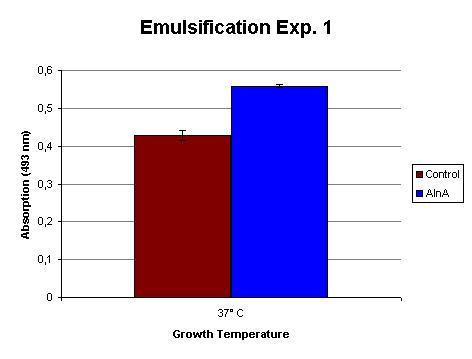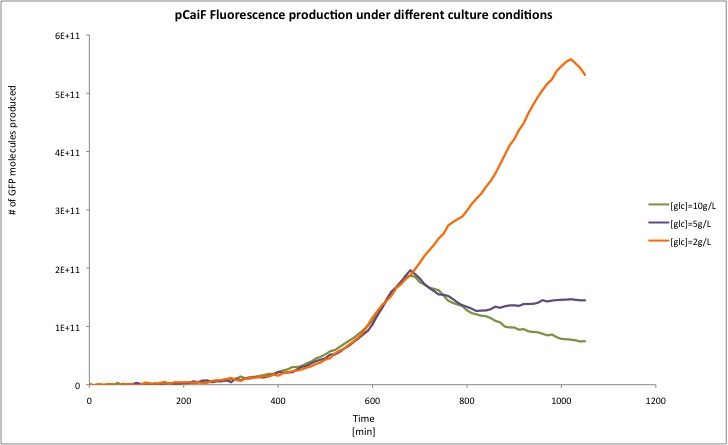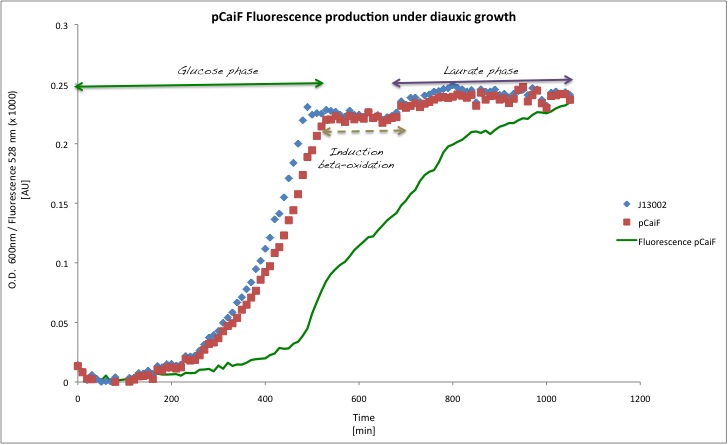Team:TU Delft/Parts/characterization
From 2010.igem.org
(→Favorite Parts) |
(→Favorite Parts) |
||
| Line 6: | Line 6: | ||
===Favorite Parts=== | ===Favorite Parts=== | ||
| + | |||
| + | ====BBa_K398206==== | ||
| + | [[Image:TU_Delft_Emuls_assay_exp1.jpg|thumb|400px|right|Emulsification of Sudan II by the isolated proteins from the control (BBa_J13002) and AlnA (BBa_K398206) culture. Read more about the [[Team:TU_Delft/Project/solubility/results|BBa_K398206 characteristics]]]]This part contains an IPTG inducible protomor with a protein coding sequence for the production of the emulsifier AlnA. It was the main subject of our [[Team:TU_Delft/Project/solubility|solubility]] subproject. | ||
| + | |||
| + | View [http://partsregistry.org/wiki/index.php?title=Part:BBa_K398206 BBa_K398206 in the '''parts registry'''] | ||
| + | |||
| + | '''Specified Components''' | ||
| + | <partinfo>K398206 SpecifiedComponents</partinfo> | ||
| + | |||
| + | '''Designer:''' <partinfo>K398206 Designer</partinfo> | ||
| + | |||
| + | '''Status:''' <partinfo>K398206 Status</partinfo> | ||
| + | <html><span style="clear:both;display:block;width:100%;"></span></html> | ||
| + | |||
| + | |||
====BBa_K398326==== | ====BBa_K398326==== | ||
pCaiF is one of our Biobricks of the sensing project. It's function is to express proteins under glucose limitation conditions. In order to measure its strength we attached the GFP generator in front of it. | pCaiF is one of our Biobricks of the sensing project. It's function is to express proteins under glucose limitation conditions. In order to measure its strength we attached the GFP generator in front of it. | ||
| Line 37: | Line 52: | ||
<html><span style="clear:both;display:block;width:100%;"></span></html> | <html><span style="clear:both;display:block;width:100%;"></span></html> | ||
| - | ==== | + | ====BBa_K398406==== |
| - | + | The solvent tolerance cluster was expressed on E. coli K12 and tested under different amounts of n-hexane. The results suggest that this part gives to cells an advantage when there's a lot of n-hexane around. The parental strain E. coli K12 seems to grow really slow at 10% (v/v) of n-hexane/M9 mixture. | |
| + | |||
| + | [[Image:TU_Delft_pCaiF_comp.jpg]] | ||
| - | + | Whereas our E. coli 406 doesn't have any problem at all. | |
| - | + | [[Image:TU_Delft_pCaiF_comp.jpg]] | |
| - | + | ||
| - | |||
| - | ''' | + | View [http://partsregistry.org/wiki/index.php?title=Part:BBa_K398406 BBa_K398406 in the '''parts registry'''] |
| - | + | ||
| + | '''Specified Components''' | ||
| + | <partinfo>K398406 SpecifiedComponents</partinfo> | ||
| + | |||
| + | '''Designer:''' <partinfo>K398406 Designer</partinfo> | ||
Revision as of 23:39, 23 October 2010
Characterization
Our favorite parts were also the ones best characterized. This page is a quick overview of the results.
Favorite Parts
BBa_K398206

View [http://partsregistry.org/wiki/index.php?title=Part:BBa_K398206 BBa_K398206 in the parts registry]
Specified Components <partinfo>K398206 SpecifiedComponents</partinfo>
Designer: <partinfo>K398206 Designer</partinfo>
Status: <partinfo>K398206 Status</partinfo>
BBa_K398326
pCaiF is one of our Biobricks of the sensing project. It's function is to express proteins under glucose limitation conditions. In order to measure its strength we attached the GFP generator in front of it. Different media, and carbon source concentrations were tested in order to obtain an insight about the protein production during starvation.
Also, it is well known that this promotor it's active during diauxic shifts, that's why we measured the GFP production using glucose as a first carbon source (concentration of 1g/L) and Potassium Laurate (5mM) as a secondary carbon source. The results that we got suggest that the part works like a charm! During glucose starvation high levels of cAMP can be found in cells, which enhances the expression of the proteins downstream of this promoter. On the other hand when the secondary carbon source is being catabolized by the cells, cAMP levels drop and thus the expression of genes regulated by pCaiF.
View [http://partsregistry.org/wiki/index.php?title=Part:BBa_K398326 BBa_K398326 in the parts registry]
Specified Components <partinfo>K398326 SpecifiedComponents</partinfo>
Designer: <partinfo>K398326 Designer</partinfo>
Status: <partinfo>K398326 Status</partinfo>
View [http://partsregistry.org/wiki/index.php?title=Part:BBa_K398331 BBa_K398331 in the parts registry]
Specified Components <partinfo>K398331 SpecifiedComponents</partinfo>
Designer: <partinfo>K398331 Designer</partinfo>
Status: <partinfo>K398331 Status</partinfo>
BBa_K398406
The solvent tolerance cluster was expressed on E. coli K12 and tested under different amounts of n-hexane. The results suggest that this part gives to cells an advantage when there's a lot of n-hexane around. The parental strain E. coli K12 seems to grow really slow at 10% (v/v) of n-hexane/M9 mixture.
Whereas our E. coli 406 doesn't have any problem at all.
View [http://partsregistry.org/wiki/index.php?title=Part:BBa_K398406 BBa_K398406 in the parts registry]
Specified Components <partinfo>K398406 SpecifiedComponents</partinfo>
Designer: <partinfo>K398406 Designer</partinfo>
 "
"

